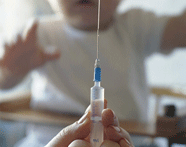Vaccination

Recently, there has been a lot of celebrity discussion about the link to autism and vaccines. Two Hollywood moms, Jenny McCarthy and Amanda Peet, have gone head to head trying to sway the public’s opinion.
In 2005 McCarthy’s son, Evan, was diagnosed with autism. Since then she has been promoting the idea that childhood vaccinations, particularly the MMR vaccine (used to prevent measles, mumps and rubella, given to babies between 12 to 18 months old), caused her son to develop autism.
Peet, on the other hand, decided to do research of her own before vaccinating her daughter Frances Pen and is now an advocate for childhood vaccination through vaccinateyourbaby.org, a campaign designed to educate the public on the truth behind vaccinations.
With such well-known public names taking such very different sides, it’s hard to know who’s right. A United States court was asked this exact question when parents of two 10-year-old boys claimed vaccinations triggered the boys autism. With the help of the U.S. Department of Health and Human Services, it was determined that the vaccination could have aggravated an underlying mitochondrial disorder that, in turn, caused the symptoms of autism. The parents won the court case.
Since then, a major trial has been ongoing in the United States in order to determine if, in fact, these vaccinations could have any link to autism in the Omnibus Autism Proceedings. This case tests three theories of how vaccines cause autism, and each hearing consists of three test subjects. The first theory is the ‘theory of causation,’ in which the MMR vaccine and the vaccines containing thimerosal, a chemical used in vaccines in order to keep them from spoiling, combine to cause autism.
The second, thimersoal-containing vaccines cause autism. Third, MMR vaccines, without thimerosal, can cause autism. Since December 1999 the only vaccines in Canada containing thimerosal is Hepatitis B, given to students in grade seven through the school system, and the flu shot (only if taken in multiple doses).
In the Omnibus Autism Proceedings the court must make a legal ruling not scientific rulings. If there is a medical explanation of cause and effect linking the vaccination to injury of any kind, the cases will win. It is important to note, however, that each court is looking at medical probability instead of medical certainty.
However, in May 2004, the Institute of Medicine, a group of impartial US scientists concluded that any links between any vaccines containing thimerosal and autism are theoretical. Many scientists believe that the only viable explanation is that the vaccines will only cause autism to those children who have an underlying disorder that it triggers.
The problem now becomes that parents are becoming increasingly skeptical of vaccinating their children in order to prevent them from becoming autistic. According to the Centers for Disease Control and Prevention, as of September 2008, only less than one per-cent of children between 19 and 35 months are not getting vaccinated.
“The ongoing success of our nation’s[US] immunization program is largely dependent on the trust that parents put in the safety of vaccines and in those caregivers who administer them,” said CDC Director Julie Gerberding, MD, MPH, in a news release. “I want to encourage parents to continue to be informed and to ask their pediatricians about the safety of vaccines or any other concerns they may have about their child’s health.”
Within the same research, the CDC found that of those children getting vaccinated, almost eight per-cent of children aged 19 to 35 months are not being vaccinated specifically against the measles. The CDC notes that this lack of coverage could explain the outbreaks of measles recently.
The children who are left unvaccinated could be picking up and spreading diseases that are now foreign to us, like the measles.
Most people believe that their school or daycare system will help to weed out those who are not vaccinated, but after contacting the Toronto District Public School Board, this doesn’t seem to be the case. Upon registering children, the school asks for immunization records. If they do not receive them, or they are not complete, the school need not do anything about it. It is not until Public Health requests the information from the school in order to ensure everything is in order that there is concern raised with incomplete vaccination records. If the records are found to be incomplete, a letter is sent to the parents to update the medical records of the students. By this time, though, your children could have been in contact with diseases by those without up-to-date vaccination records.
Peet, in a recent interview with Stanford University, had a message for those considering not to vaccinate their children, “I hope parents understand that when they do not vaccinate their kids, they are able to make that choice only because most of us are vaccinating. We are creating a barricade around their un-vaccinated children and that is what keeps them safe.”
To find a vaccination schedule or more information on vaccines check your local public health office.
- Immunization is not mandatory in Canada because of the Constitution
- Only three provinces have regulations to require proof of information for school entrance
- Ontario and New Brunswick require proof for: diptheria, polio, tetanus, measles, rubella and mumps immunization
- In Manitoba, only proof of the measles vaccination is required
- It is possible, though, to get exemptions in these three provinces for: medical or religious grounds and reasons of conscience



